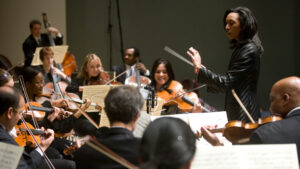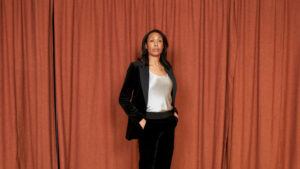
Los Angeles Philharmonic’s Rock My Soul Festival, curated by Julia Bullock, has more exciting programming for its second full weekend. On Friday the orchestra will play works by contemporary composers Valerie Coleman and Courtney Bryan along with the Symphony No. 3 by Florence Price. On Saturday Rhiannon Giddens, whose opera Omar has its final performance at LA Opera on Sunday, will perform with the LA Phil and the Resistance Revival Chorus. Leading both shows from the podium will be Jeri Lynne Johnson.
Johnson most recently conducted the world premiere performances of This Little Light of Mine at Santa Fe Opera. She is also the founder and Artistic Director of Black Pearl Chamber Orchestra. In 2015 she founded DEI Arts Consulting “for cultural institutions seeking to create a culture of belonging.”
When you click on the about tab on her website, the page says “Black female conductor,” a title which is as unique as you think it is.
We spoke a few weeks ago while she was in New Mexico for This Little Light of Mine. We spoke about working with other women, the Rock My Soul Festival, opportunities she’d like to have and more. What follows are excerpts from our conversation that have been edited for length and clarity.
You’ve stated that it was a concert when you were seven years old that instilled in you this passion to be involved with music. Do you remember what was on that program and was there anything specific about that day?
I don’t remember the exact program. I just remember it was Beethoven. It was probably one of the odd numbered symphonies. It was the Minnesota Orchestra when Neville Marriner was the music director. As a young musician I was in love with music and as a pianist I realized I don’t see a piano on stage. I just figured out that what I have to do is what that man with the stick is doing. If I want to make that music I have to be a conductor.
They could have played a Beethoven piano concerto. Then what would you have done?
You know that is a very interesting question. That has never occurred to me. I always loved piano, but I always wanted to be a conductor. I knew that I made the right choice because I never get nervous as the conductor. As a pianist you get so nervous in your hands and everything. I just never get nervous as a conductor. I always feel like I can trust the musicians, God forbid, if anything goes wrong.
What was your first reaction when you heard about the Rock My Soul Festival and what makes this festival unique?
I think what makes this festival unique is the wide range of talents that people are going to see on the stage. Nowadays as artists it’s not unusual for us to have a variety of genres and styles that we’re fluent in. That used to be very frowned upon. In an earlier era you only did classical music. If you were to do anything else you didn’t tell anybody about it for fear that you wouldn’t be taken seriously as a classical musician. I think nowadays there is a willingness to recognize excellence across a variety of genres and styles.
We’re also doing, of course, compositions by women whose voices are typically underrepresented in music; folk living and who have passed on. I think the thing that connects these composers across time is their willingness to engage in the cultural issues of their day as composers.
For Courtney Bryant, her piece was about Black Lives Matter, especially after the murder of George Floyd. Florence Price and Margaret Bonds’s work was written in the era of the Harlem Renaissance. So there was a lot of connection around what it meant to be African-American, what it meant to be Black, what it meant to be Negro in America, as they called it. I wanted to engage with who they were as people and use their music to do so.
Julia Bullock told me she was really inspired by that relationship between Florence Price and Margaret Bonds and how she feels the world doesn’t allow for that much anymore because people seem to feel the need to be more competitive with one another. Has it really gotten to that point?
If that is the case I have not experienced it. This is my first time working with Julia who is a lovely person. I work with a number of African-American women. For me, the experience has always been one of mutual respect and gratitude and recognition.
If we are all here at this place together, it is because we all have sacrificed a great deal to be there. We have all earned our place here. For me it has been nothing but mutual respect and collegiality and a willingness to also hold the door open for other people of talent that maybe we haven’t heard of. That we can connect through and find out about it without putting it a negative spin on it. The more that Black women in classical music are able to work with each other and collaborate, like on this festival, you begin to build that professional trust and that network so that you see more of us out there performing more regularly.
In a video that you did for Careers for Girls you mentioned that it was your job to express emotion from the podium so that you can get the emotion out of the orchestra. What emotional connection do you feel to the work of Florence Price and Margaret Bonds that you then plan to translate to the orchestra?
The connection for me, if I can be raw here for a moment and vulnerable and transparent, which I know is like a no-no for conductors, but it is the inherent understanding of genius, stifled genius, unrecognized genius, not given the support and the nourishment that it deserves and having to find its own way. I understand that completely.

I can’t tell you as a young conductor how many times I was denied opportunity or just not even paid attention to because of who I am. So I look at these works and women with enormous talent and such incredible gifts who, had they had the ability to work with someone like a Nadia Boulanger as Aaron Copland did, what more would we have seen from them? What we have is incredible and so interesting, unbelievably rich, complicated, complex and soulful. It brings tears to my eyes to see the level of excellence that their works are now commanding and the attention they’re getting.
You were talking about genius stifled and denied opportunities. It’s not an easy path being a woman who conducts classical music. I’m sure it’s even tougher being a Black woman who conducts classical music. How much more complicated does that equation become when you are a person of color?
The way that race and gender intersect in my career has been very interesting. Not everything that I’ve dealt with has been related to that. Conducting is hard, as you know. For young conductors, it’s just a difficult time. [Composer] Jennifer Higdon and I were talking and I was lamenting when I was younger, like, oh, this is never going to work. I should just give up and become a buyer for Neiman Marcus or something.
She told me this is a war of attrition. She said whoever lasts the longest lives. She talked about her experience as a composer, as a woman. So I have that tape loop in my head – this is a war of attrition.
I think the timing was just right now for me to had been working for this amount of time, to be holding my breath, to be in a position to be able to take advantage of when the L.A. Phil calls and when the Chicago Symphony calls and when Santa Fe Opera calls. The only thing keeping me from these positions before George Floyd was being a Black woman.
Now because I’m a Black woman people are now beginning to pay attention to me. The work has always been there. The study, the commitment to excellence of artistry, has always been there. The only thing has changed is people’s perceptions of where excellence resides as an artist and where it can reside and who can embody that on the podium.
Is true systemic change going to happen without the same changes that we see on the stage taking place in the executive offices?
You’re absolutely right that it has to be. There’s always a power dynamic in any of these relationships of who hires whom and who makes those decisions. We always tell our clients that that representation is not enough. It has to be true empowerment. Until there’s a very diverse setting at the table of who gets to make these decisions it’s always going to be a struggle.
I think there’s a lot of fragility around will donors accept this? Will they like it? Change is hard for anyone and you have to be prepared to lose some people along the way. Some people just aren’t going to want to change and that’s okay. But in order to do the work authentically, you have to be prepared to lose a little something in order to gain something on the other side.
And how many Beethoven festivals does any one organization need to do every few seasons?
I’m going to put it out there in the universe. I really want to be the first Black woman to have a set of Beethoven’s nine symphonies recorded. It was kind of my dream as a young conductor so I’m holding fast to that.
I think since you’re making your Santa Fe Opera debut, you should also put on your list conducting the Ring Cycle.
That is on my to-do list. I studied it extensively. I think of Wagner, as a person, as a really awful human being. But his music is just stunningly gorgeous.
Florence Price, in a letter to composer/conductor Serge Koussevitzky, then music director of the Boston Symphony, said, “Unfortunately the work of a woman composer is preconceived by many to be light, froth, lacking in depth, logic and virility. Add to that my race – I have colored blood in my veins – and you will understand some of the difficulties that confront one in such a position.” If you had a chance to update Florence Price about the world she so wanted to be a part of, what would you say?
I would give her the same advice that Jennifer Higdon told me: that it is a war of attrition. We fight these battles on hearts and minds and that art is a mighty warrior. And that people see you. People appreciate you and people understand you. The artists who understand your work, who understand your struggle, will find you. She’s having her moment and hopefully this moment lasts beyond the political interest of the moment and into real recognition of her as an artist and placing her and Margaret Bonds and others in relationship to their colleagues.
Main Photo: Jeri Lynne Johnson (Courtesy LA Philharmonic)










